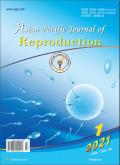Effect of heparin on recurrent IVF-ET failure patients
IF 0.6
Q4 REPRODUCTIVE BIOLOGY
引用次数: 0
Abstract
Objective: To elucidate the possible role of unfractionated heparin in patients with failed repeated in in vitro fertilization and embryo transfer (IVF-ET) and thrombophilia. Methods: This case control study evaluated the efficacy of the unfractionated heparin in increasing the pregnancy and implantation ratio in women with recurrent IVF-ET failures. Eighty-six women received in vitro fertilization/intracytoplasmic sperm injection (IVF/ICSI) with a record of three or more previous IVF-ET failures. Participants were randomly distributed into two groups. Group A (n=43) received unfractionated heparin 5 000 IU twice daily, and group B (n=43) did not take any antithrombotic drugs. Coagulation abnormalities such as factor V Leiden (FVL) mutation, methylene tetra hydro folate reductase (MTHFR) mutation and prothrombin mutation (FII) were evaluated. Age, body mass index, basal follicular stimulating hormone, basal estradiol, duration of infertility, and number of IVF-ET failures were compared between two groups. Results: 45.0% and 17.4% of women were pregnant with and without MTHFR and prothrombin mutation, respectively, when they received unfractionated heparin treatment. The implantation rate was more in group A (12.5%) than group B (4.3%) and differences in the fertilization rate of the two groups were observed (27.7% vs. 35.9%). The clinical pregnancy rate per cycle was remarkably more in group A (30.2%) than group B (14.0%). Conclusions: Heparin is a safe and valuable treatment for patients with repeated IVF-ET failures. The clinical pregnancy and implantation rates are higher in the heparin-treated group in contrast with the control group. Trial registration: The trial registration was done with clinical registration number of “ IRCT138807202575N1”.肝素对复发性IVF-ET失败患者的影响
目的:探讨未分离肝素在体外受精和胚胎移植(IVF-ET)失败及血栓形成患者中的作用。方法:本病例对照研究评价未分级肝素对提高IVF-ET复发失败妇女妊娠和着床率的疗效。86名接受体外受精/胞浆内单精子注射(IVF/ICSI)的妇女有3次或3次以上IVF- et失败的记录。参与者被随机分为两组。A组(n=43)每日2次给予未分离肝素5 000 IU, B组(n=43)未服用任何抗血栓药物。评估凝血异常,如V - Leiden因子(FVL)突变、亚甲基四氢叶酸还原酶(MTHFR)突变和凝血酶原突变(FII)。比较两组患者的年龄、体重指数、基础卵泡刺激素、基础雌二醇、不孕持续时间和IVF-ET失败次数。结果:接受肝素单次治疗时,MTHFR和凝血酶原突变的孕妇分别占45.0%和17.4%。A组着床率(12.5%)高于B组(4.3%),两组受精率差异(27.7% vs. 35.9%)。A组临床单周期妊娠率(30.2%)明显高于B组(14.0%)。结论:肝素对于反复IVF-ET失败患者是一种安全且有价值的治疗方法。肝素治疗组临床妊娠和着床率均高于对照组。试验注册:临床注册号为“IRCT138807202575N1”。
本文章由计算机程序翻译,如有差异,请以英文原文为准。
求助全文
约1分钟内获得全文
求助全文
来源期刊

Asian Pacific Journal of Reproduction
Veterinary-Veterinary (all)
CiteScore
1.70
自引率
0.00%
发文量
588
审稿时长
9 weeks
期刊介绍:
The journal will cover technical and clinical studies related to health, ethical and social issues in field of Gynecology and Obstetrics. Articles with clinical interest and implications will be given preference.
 求助内容:
求助内容: 应助结果提醒方式:
应助结果提醒方式:


